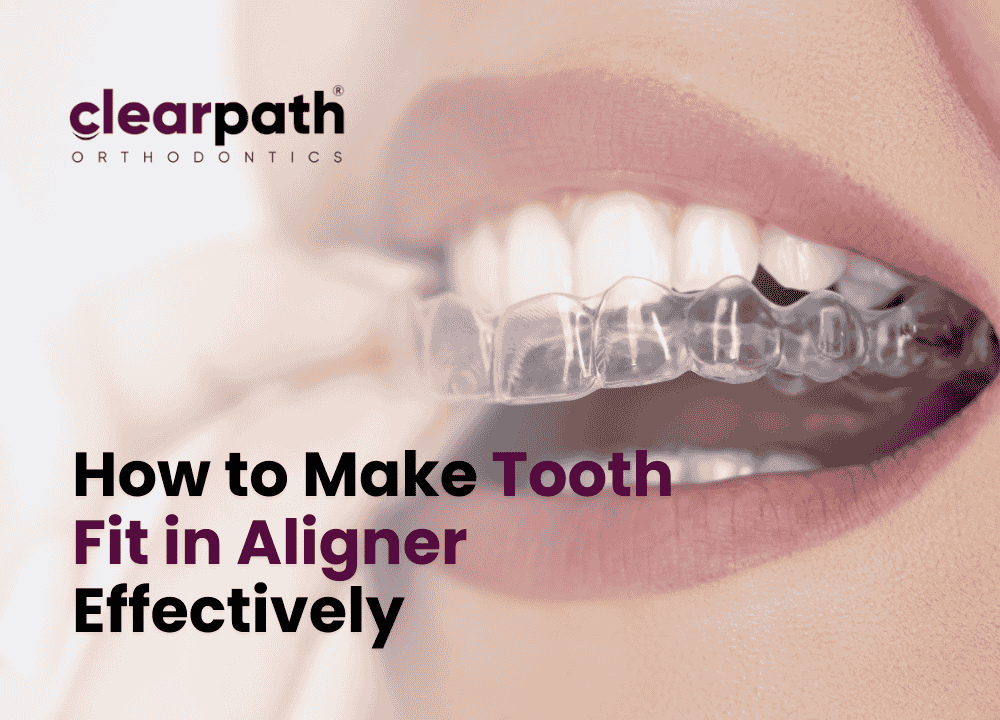Whether you’re an adult wanting to fix your teeth or a parent wanting to know which type of braces are best for your child, this blog is for you. “Are Aligners better than braces?” is one of the most popular questions people ask their orthodontists before starting orthodontic treatment.
With so many kinds of braces to choose from, like standard metal and ceramic braces, self-ligating braces, lingual braces, and clear aligners. It’s normal for people to get confused about what will work best for them. So, we’ve given you a lot of information about the best option to go with.
Table of Contents
ToggleWhat are Clear Aligners?
Clear aligners were developed to address patients’ concerns about the cosmetic consequences of wearing orthodontic appliances like metal and ceramic brackets. When it comes to straightening teeth, aligners are the way to go for individuals who value discretion.
Wearing clear aligners, which are transparent trays made of biocompatible, soft plastic, for the recommended 22-23 hours each day is necessary for proper tooth movement. The average wear time for an individual set of aligner trays is about two to three weeks. Each patient’s clear aligners are made specifically for them by taking the digital scans first.
Their lack of wires, metal brackets, and other attachments makes them popular among patients. They are almost transparent and cannot be noticed easily.
How Do Clear Aligners Work?
Wearing clear aligners causes gentle but continual pressure to be applied to the teeth. These ongoing pressures realign the teeth and keep them there. Because the aligners exert only a fraction of the power exerted by traditional braces, patients seldom report the severe pain and discomfort associated with wearing traditional braces.
Pros and Cons of Clear Aligners:
Clear aligners have pros and cons, just like any other medical or dental treatment.
Pros:
- Clear aligners look the best out of all the braces, which is why they are called “invisible braces.”
- Unlike traditional braces, you can eat whatever you want while you have clear aligners on.
- People like clear aligners because they are much more comfortable than regular braces.
- Since clear aligners are made of plastic trays, they can be taken out. It is very easy to brush, floss, and take care of your teeth. When gums and teeth are healthy, treatment goes faster.
- You don’t have to see your doctor every week during your treatment with clear aligners. You can check in with them about your treatment every four to six weeks.
Cons:
Even though clear aligners have many benefits, they also have some problems, such as:
- The success of braces and how long it takes to finish treatment depend on how well the patient wears them. If you don’t wear the aligners for the right amount of time or forget to wear them regularly, the treatment could take longer and not go the way it was supposed to.
- You should use clear braces When your teeth are slightly out of place. But when it comes to serious cases of misaligned teeth or cases that need surgery, metal or ceramic braces are the best choice.
What are Conventional Braces?
They have been a part of dentistry for many years and have helped millions of people get the smiles of their dreams. Even though standard braces have changed over time and been replaced by newer types, they are still used today.
Traditional braces are made of stainless steel and have small metal brackets that are stuck to the teeth. A stainless steel archwire is put into the holes in the brackets. The archwire can be tighter or loosened based on how much force is needed to move the teeth into their right places. At each visit to the dentist, the archwire will be changed or replaced until your teeth have moved to their new places.
Even though metal braces are still used, people wanted more attractive choices. This is how clay braces came to be. Ceramic braces are similar to metal braces, but they are tooth-colored instead of silver or gold. This makes them less noticeable than braces made of metal. Like metal braces, the clay brackets are stuck to your teeth, and a metal or metal-coated metal wire runs through these brackets.
Ceramic braces were less noticeable than metal braces, but they might still become discolored and made for a less-than-ideal appearance throughout orthodontic treatment.
Pros and Cons of Braces:
Here are some good and bad things about standard metal braces and clay ones:
Pros
- Conventional braces are the most lasting type of braces because they are the hardest.
- They are very flexible and can fix even the most difficult problems with the way teeth fit together.
- People of all ages can use metal and clay braces that have been around for a long time.
- There are a lot of color choices and ways to connect the braces, depending on what the patient and doctor want.
Cons
Even though traditional braces are still popular today because they have pros, they also have cons:
Aesthetic problems: The worst thing about standard metal and clay braces is that they don’t look good. Most people already don’t like how their teeth look because they aren’t straight. Putting on an ugly metal or plastic smile is like adding another problem to their list.
Discomfort: Whether you like it or not, traditional braces have a lot of metal and plastic pieces stuck to your teeth. These can be very painful and uncomfortable for the person who has them.
Irritation: The metal and clay braces and wires in your mouth can irritate your gums, cheeks, and the inside of your lips. During their treatment with braces, many people get sores.
Hygiene is hard to keep up: When you have standard metal or ceramic braces, it’s hard to brush and floss your teeth. This is a big problem. Did you know that when you wear braces, food can get stuck in more places? Also, there are more chances for plaque and tartar to build up, which can lead to gum diseases and cavities.
Restrictions on food: Whether you have standard metal or ceramic braces, your orthodontist will tell you to avoid hard, sticky, or chewy foods that can break your brackets or make them come loose from your teeth. So you might have to say goodbye to your favorite gol gappa’s, chaats, pizzas, burgers, and much more!
WHAT DO THE RESULTS SHOW: WHICH ONE SHOULD YOU CHOOSE?
Since its introduction, clear aligners have helped millions of people straighten their teeth. Compared to braces, transparent aligners are the apparent winner because of their improved looks, shorter treatment periods, greater levels of comfort and convenience, and lower prices. Even while transparent aligners can’t be utilized in more complex instances, some orthodontists are now trying out a hybrid approach that involves utilizing both braces and aligners at different stages of therapy. The outcomes of the same, however, have not yet been seen.
Wrapping it up!
Talk to your orthodontist if you’ve been debating whether or not clear aligners or braces are the better option for you to straighten your teeth.
Your orthodontist will make recommendations after reviewing your teeth, jaws, bite, and diagnostic data to determine what’s best for you. If you have the option of clear aligners, choosing them would be one of the finest choices you ever make. Want to spend less money without sacrificing quality on your clear aligners? Don’t hesitate to get in touch with ClearPath!
ClearPath:
ClearPath Orthodontics takes great pride in offering the most modern dental treatments. They offer a range of dental services, from simple fillings to more complex procedures. With world-class specialists, cutting-edge technology, and a fantastic support team, ClearPath is committed to providing the finest professional services and treatment planning. You just need to get in touch with the representative of ClearPath and he’ll connect you with your nearest ClearPath-certified dentist to get your treatment started.











